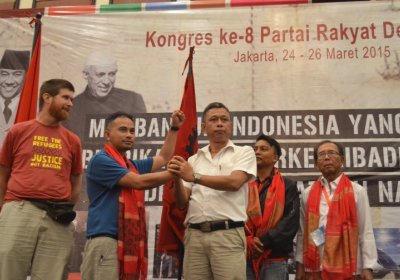The left-wing People's Democratic Party (PRD) held its eighth congress in Jakarta from March 24-26. This was the first time its congress was held openly.
The open congress marks an important new stage of development for the party, which has a history of underground organising dating back to the era of the Suharto dictatorship that was overthrown in 1998.
1048
Jay Famiglietti, a senior water scientist at the NASA Jet Propulsion Laboratory in California, made a dire warning in March: there is only one year's worth of water left in the state's reservoir storage and river basins.
Famiglietti said even nature's oldest water backup supply —groundwater — could be gone soon after the reservoirs dry up.
About 38.8 million people live in California, which produces much of the United States' food. California's drought is throwing the ecology of the region into crisis, and ordinary people are scrambling for ways to help.
There is a tense stand-off right now between Greece's government and the so-called troika — the European Commission, the European Central Bank (ECB), and the International Monetary Fund (IMF). ECB President Mario Draghi recently went so far as to deny that his institution was trying to blackmail Greece's left-wing anti-austerity government.
But blackmail is actually an understatement. It has become increasingly clear that the troika is trying to harm the Greek economy in order to raise pressure on the new Greek government to agree to its demands.
A new group has been established to campaign for women’s rights in Indonesia. In December, more than 100 women met in Jakarta to launch Indonesian Women’s Action – Kartini (API-K), which has begun campaigning for women’s rights in the workplace, home and society.
Participants came from 32 cities across Indonesia. They included women who are involved in existing women’s networks, students, workers and urban poor. They spent three days discussing issues facing women in economics, politics and culture.
The Inconvenient Genocide: Who Remembers the Armenians?
Geoffrey Robertson QC, Vintage Books,
Sydney, 294 pages, 2014
On the eve of Nazi Germany’s 1939 invasion of Poland, Adolf Hitler urged his generals “to kill without mercy men, women and children of the Polish race or language”.
“Only in such a way will we win [what] we need,” Hitler said. “Who, after all, speaks today of the annihilation of the Armenians.”
The Nazi leader was referring to the genocide carried out by the Ottoman Turkish empire in 1915 against the Armenian people within its borders.
Fears over the safety of the 18,000 civilians trapped in Yarmouk, south of the Syrian capital of Damascus, have grown following reports that the Islamic State (IS) terrorist group has taken control of large areas of the Palestinian refugee camp.
The IS, notorious for its brutal execution of hostages in the areas it occupies in Iraq and Syria, infiltrated Yarmouk camp on April 1.
Greek Prime Minister Alexis Tsipras said on April 2 that his government would strengthen the country's public health system by the hiring of 4500 extra staff and abolishing a compulsory €5 fee for treatment at public hospitals, TeleSUR English said that day.
The measure forms part of a broad package of reforms aimed at overhauling the country’s broken medical system by providing universal access to quality healthcare.
The Greek parliament has debated a proposal to establish a committee to investigate loan agreements between previous governments and international lenders, TeleSUR English reported on March 31.
The motion, tabled by ruling anti-austerity party SYRIZA, would examine credit accords dating back to 2009 with organisations including the International Monetary Fund, the European Union and the European Central Bank.
A lot is at stake in Turkey’s parliamentary elections to be held on June 7 — for the ruling Justice and Development Party (AKP) as well as the oppressed Kurdish population.
White City, Black City: Architecture & War in Tel Aviv & Jaffa
By Sharon Rotbard
Pluto Press, £14.99
In July 2003, Unesco put the “White City” of Tel Aviv on its list of World Heritage Sites. It took almost 20 years of incessant campaigning by the Israeli state to secure this recommendation that, de facto, legitimised far-reaching aspects of Zionist ideology.
But was there any merit to the Tel Aviv case in the first place? In fact, the building of Tel Aviv began adjacently to Jaffa — one of the oldest continuously inhabited cities of the world — only from about 1909.
Terrorists from Somali Islamist group al-Shabaab massacred 142 students at Garissa University in northern Kenya on April 2. In response, the Kenyan airforce bombed what they said were al-Shabaab camps in Somalia on April 5 and 6.
Kenyan forces have been occupying Somalia since October 2011, under African Union (AU) auspices, along with troops from Uganda and Burundi.
On April 7, students protested in Garissa and the Kenyan capital, Nairobi, against the seven-hour delay in security forces reaching the university during the attack.
The United States is providing crucial support to regional ally Saudi Arabia ― a big buyer of US arms ― as it launches a new war in the Middle East by attacking neighbouring Yemen.
A Saudi-led coalition of Western-aligned, mainly Sunni Islamist, Arab government's launched air, naval and ground military offensive against Yemen on March 25.
Saudi Arabian forces are being supported by military planes from the United Arab Emirates, Qatar, Bahrain, Kuwait, Jordan, Morocco, Sudan and Egypt, which is also supplying naval forces.
- Page 1
- Next page









